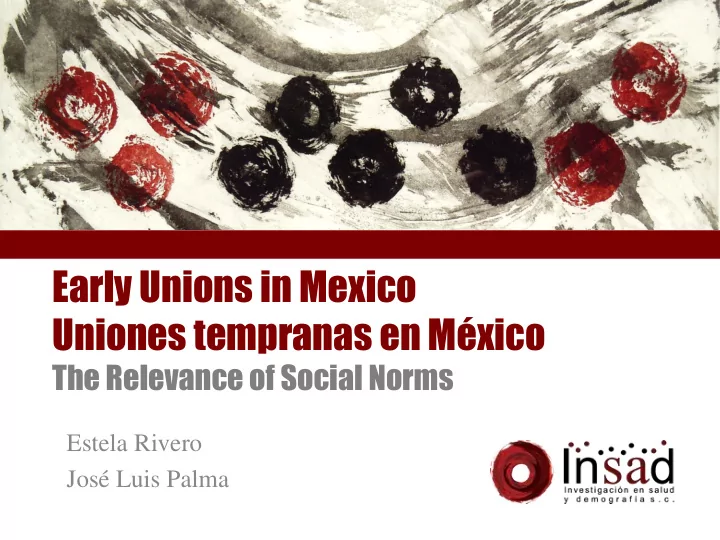

Early Unions in Mexico Uniones tempranas en México The Relevance of Social Norms Estela Rivero José Luis Palma
Our INSAD Study • Exploratory o Inter-census survey: 2015 • National, state and regional level estimations • Association with variables that contribute to the vulnerability of young women in a union o In-depth interviews with women who entered a union before age 18 in four states and key informants in six states • Not focused on social norms, but turned out to be an important explanation for early unions.
Key Findings Early unions are still frequent in Mexico. o One in every 10 women age 15 to 17 has been in a early union. o 82% of early unions are non-formal. Women who had been in early unions were more likely to : o Drop-out of school (90% vs. 15%) o Have at least one child (47% vs. 1%) There is no single profile of women in early unions.
Percentage distribution of girls age 12 to 14 in an early union Non-formalized Age difference with Percentage of union or marriage partner cases Marriage 5 years or less 0.30 Marriage 6 to 10 years 0.22 Marriage 11 years or more 1.34 Non formalized 5 years or less 0.97 Non formalized 6 to 10 years 0.96 Non formalized 11 years or more 4.18 TOTAL 8
Percentage distribution of girls age 15 to 17 in an early union Non-formalized Age difference with Percentage of union or marriage partner cases Marriage 5 years or less 3.76 Marriage 6 to 10 years 2.28 Marriage 11 years or more 10.38 Non formalized 5 years or less 15.61 Non formalized 6 to 10 years 10.99 Non formalized 11 years or more 49.01 TOTAL 92
Great variations in the conditions and nature of early unions across regions 31 80%-100% 25 … Chiapas … Chiapas 100 CDMX Chihuahua % of informal unions Guanajuato Guanajuato Nuevo León 60%-80% 19 39 17 5 40%-60% 3 Chiapas Chihuahua 4 Durango CDMX Guerrero 0.5%-4% 4%-7% 7%-13.5% % of women 12-17 in a union
A Social Norms Framework Individuals make their Major decisions in life are decisions based on the influenced by social norms preferences they have, the about the appropriate timing, options they have to choose sequencing, and major events from, and the beliefs they have in life. about these options. Social norms about age are Social norms influence also part of the system that decisions affecting the options that individuals perceive, the divides the life-span into implications they believe their recognized seasons of life. options have, and their preferences. Life Course Theory Bicchieri, et al 2014 Elder, Billari
The role of social norms in the early unions were analyzed. Sexuality can only be Perceptions of Romantic legitimally practiced adulthood and expectations when in a union status Agency is an Societal: Out of wedlock pregnancy is a attribute of adults Women: disruption of the normative life course Eloping/asking a woman to Becoming an adult, Parents: When in an out-of-wedlock move in pregnancy, union is the way to save for women, means together is a the girl’s honor manifestation having a partner of men’s love Women: To experiment with sexuality they must be in a formal and A woman’s status is union commitment dependent on being Men: Expect sex and can better someone’s wife control a non-experienced partner
Examples: How these Social Norms Impacted the Women Interviewed Proximate Women in our Perceived social norms determinants of study that played a role the union • Pregnancy is expected to María, Arcelia, Pregnancy happen within a union. Elsa • Need to repair their honor • Brenda, Women can only experience Spent a night out Yolanda, Dafne, their sexuality within a union • Need to repair their honor Patricia, Sandra • Romantic expectations Accelerated Veronica, • Women’s status comes from Rafaela courtship being someone’s wife
Summary Importance and nature of early unions in Mexico: ▪ Very common in some communities ▪ Great variety of characteristics, conditions and determinants ▪ Happen in very different contexts Social norms play out at different stages of the process: ▪ Governs who/when can have sex ▪ Determines the options of out-of- wedlock pregnancies ▪ Signals the status of individuals ▪ Shapes the consequences of early unions
Summary Policy implications: ▪ Evidence-based ▪ Transform norms regarding: • Gender/ women’s options/ destigmatize teenage sexuality • Empower/agency Future research needs: ▪ Better understanding of factors leading to early unions and interventions to prevent/mitigate ▪ Meanings of being in a union ▪ The role of social norms in the consequences & coping alternatives of women and girls
For more information, contact: Estela Rivero INSAD Malaga 88 Insurgentes Mixcoac Mexico City 03920 Email: estelariv@insad.com.mx For access to the Executive Summary and the full 83-page report, go to: http://insad.com.mx/site/wp-content/uploads/2017/10/Insad-Report-Early-Unions.pdf
Recommend
More recommend